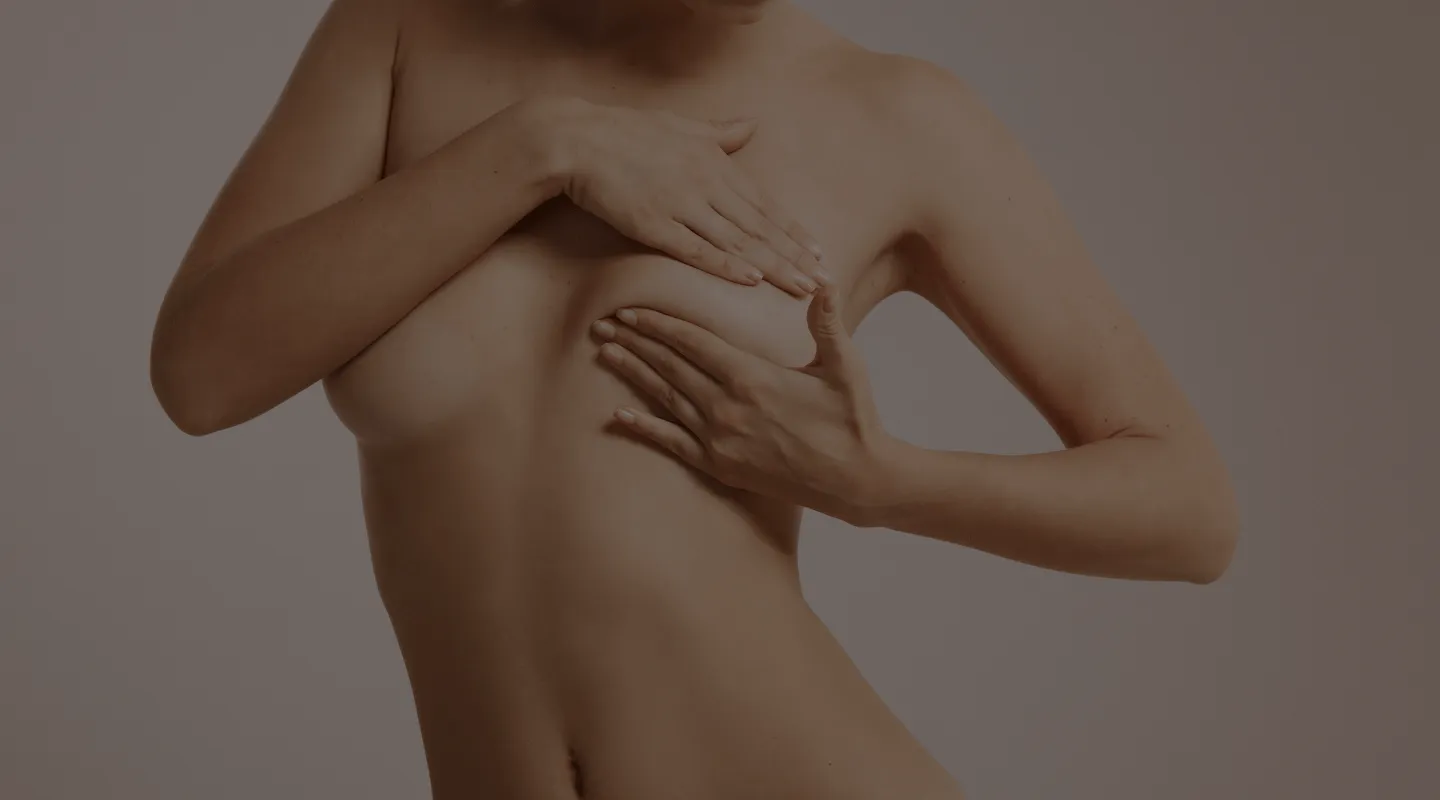
Breast Lipofilling
Your Breast Lipofilling in Tunisia at an affordable price
Opt for a medical stay with Tunisia Destination Santé and benefit from the expertise of our specialist doctors and the best healthcare facilities in Tunisia. Thanks to our tailor-made service, you will benefit from complete support in a secure and comfortable setting.
How does it work?
Breast Lipofilling or Breast Augmentation by Fat Injection in Tunisia
Breast lipofilling involves extracting fat from certain parts of the body (such as the thighs, hips or abdomen) by liposuction, then reinjecting the fat stem cells into the breasts. Since you are using your own cells, the fat used prevents the development of any type of allergy and ensures an absolutely natural result.
What are the advantages of breast lipofilling?
Breast augmentation by lipofilling has considerable advantages:
- The results of fat injection are lasting and permanent;
- It is a less expensive operation than other breast augmentation methods;
- It is impossible to develop allergies, as the fat used comes from your own body;
- The method, natural and safe, leads to a result that is just as natural;
In this procedure, a part of the body is targeted to extract the fat using micro-cannulas. In general, the doctor takes the fat where he finds a concentration of adipose tissue. Thus, the extraction areas are most often the abdomen, thighs or hips. The extracted fat must then be filtered and purified. Afterwards, the fat will be reinserted with very fine cannulas into the areas to be corrected. To obtain the desired correction, the surgeon may repeat this procedure several times.
What is the cost of breast lipofilling in Tunisia?
In Tunisia, the package for breast lipofilling includes all medical expenses:
- fees of the plastic surgeon,
- anesthesiologist,
- operating room,
- hospitalization,
- nursing staff,
- dressings, post-operative care and examinations
How to prepare for breast lipofilling in Tunisia?
To ensure the smooth running of the procedure, several tests must be carried out beforehand. Among the essentials, there is a blood test, an electrocardiogram (ECG) and a mammogram. Regarding medications to avoid, aspirin or NSAIDs are cited because of their anticoagulant effect.
How does the post-operative period for breast lipofilling in Tunisia go?
Strict rest is recommended for at least one week after the operation. In addition, physical and sporting activities should be avoided during the first week post-operatively. For those who have sedentary jobs, you can resume work the next day. As a general rule, the result is definitive after 3 to 6 months. During the first month after the operation, the breasts show edema following the operation. Note that the patient must monitor any possible weight loss. Indeed, a sudden weight loss could reduce the volume acquired by lipofilling.
If you notice redness, possible but rare, in the lower quadrants of the breast, avoid sun exposure for at least 30 days after the operation. The doctor may prescribe lymphatic drainage massages in the liposuction areas from the first week after the operation. In order to guarantee optimal healing, do not apply excessive pressure to the breasts for at least one month after the procedure. Finally, regarding diet, no specific restrictions apply after the operation.
What are the possible complications?
Although complications are rare, asymmetries or irregularities in the skin profile may occur and can be easily corrected at least 6 months after the operation. Hematomas or infections are rare. To prevent the former, infiltrations of anesthetic with vasoconstrictor are performed. An antibiotic is generally prescribed to avoid the risk of infection. Swelling and bruising are more likely to disappear about two weeks after the operation.
What are the results observed before and after breast lipofilling?
The final result of the operation can be considered stable and definitive three months after the injection of fat into the breast. These results are lasting and permanent. Daily activities can be resumed one week after the operation.
Will the scars be visible?
The small cannulas used to insert the adipose tissue into the breast are very discreet and therefore do not cause any marks or scars. However, when it comes to removing this same tissue, a scar of up to 3 mm (that of the small cannula used) may possibly form.
How can breast lipofilling help new mothers regain their pre-pregnancy body?
Pregnancy and breastfeeding affect the appearance of the breasts
Becoming a mother is an extraordinary and unique experience: indeed, nothing can equal the joy that motherhood brings and the arrival of a child is undoubtedly one of the most wonderful moments in a woman’s life. However, pregnancy brings its share of changes, both in daily life and in a woman’s body: after childbirth, she devotes herself entirely to caring for her child while often noticing that her body has been transformed by pregnancy and breastfeeding. Some mothers therefore have a legitimate desire to regain their body or breasts as they were before pregnancy.
Breast lipofilling, an operation that consists of increasing the volume of the breasts using the natural fat from your body, is the ideal solution for mothers who wish to correct excess fat accumulated during their pregnancy and regain the volume of their breasts after breastfeeding. In recent years, this breast augmentation technique has been increasingly in demand, without having to resort to breast implants.
New mothers regain self-confidence
Giving new mothers confidence again is paramount: after their pregnancy and breastfeeding period, they aspire to quickly regain their figure. The marks on their stomach, sometimes linked to a caesarean section, as well as fat deposits, deflated and sagging breasts, and a tired face can affect them. Fortunately, thanks to breast lipofilling, they can regain their femininity safely. This procedure does not carry any risk of allergy, as the fat is taken from where it is most present in the body (such as the abdomen or thighs) and then processed before being reinjected into the breasts. The treatment is also used for other parts of the body such as the face. The young mother can plan a breast lipofilling 6 to 12 months after childbirth.
What procedures can be combined with breast lipofilling?
It is possible to opt for an individual or combined approach when it comes to breast lipofilling. The doctor can combine this technique with other aesthetic facial procedures such as blepharoplasty, rhinoplasty, or facial lipofilling, to name but a few examples. It can also be combined as part of reconstructive surgeries such as breast reconstruction, etc.
Our advantages


Contact and request a quote for breast augmentation by fat injection: breast lipofilling in Tunisia
Our team is always at your disposal to assist and guide you through all the procedures for breast lipofilling also called breast augmentation by fat injection. If you want to have your procedure in Tunisia, trust the professionals of Tunisia Destination Santé. We are by your side at every step to facilitate the preparation of your file and to plan your stay. Do not hesitate to contact us for more information and a free quote, without any obligation on your part.
Your health, our priority.
Request your free quote.
Frequently Asked Questions
Breast lipofilling can make the interpretation of mammograms a little more complex due to the presence of microcalcifications, fatty cysts and fatty nodules that can form after the procedure. However, experienced radiologists can usually distinguish these changes from suspicious abnormalities. Therefore, inform the radiologist of the procedure for a correct interpretation of the results.
Breast lipofilling uses autologous fat. Thus, a more natural feel is obtained compared to silicone or saline implants. In this sense, breasts augmented by lipofilling tend to be more supple and move more naturally with the body.
The risk of infection is generally lower with breast lipofilling than with implants, as there is no foreign body introduced into the body. However, there is always a risk of infection at the fat harvesting and injection sites, although this risk is minimal when the procedure is performed under sterile conditions and by an experienced surgeon.
Yes, surgeons often opt for breast lipofilling to correct asymmetries and deformities after a partial mastectomy or breast-conserving surgery. Fat can be injected precisely to restore volume and improve symmetry.
In general, the areas used for fat harvesting include the abdomen, thighs, flanks and buttocks. Note that the doctor chooses these areas based on the availability of fat and the preferences of the patient and surgeon.
Yes, breast lipofilling can be combined with other cosmetic procedures, for example with extended liposuction, a breast lift (mastopexy), or even facial treatments. In addition, this combined approach helps to maximize results and minimize overall recovery time.
In the long term, breast lipofilling can improve skin texture and elasticity due to the stem cells present in the injected fat. These cells can help regenerate the skin and surrounding tissues, thus improving the overall quality of the skin.
Breast lipofilling is less likely to cause loss of sensation compared to augmentation with implants, as it does not involve large incisions or manipulation of the main nerves of the breast. However, like any surgical procedure, there is a small risk of temporary or permanent changes in sensation.
Generally faster than that of breast augmentation with implants. Most patients can resume light activities after about a week, while normal activities in 2 to 4 weeks. Post-operative advice includes wearing a compression bra, avoiding strenuous exercise for several weeks, and following the surgeon’s instructions for caring for the harvesting and injection sites.
Breast lipofilling is less invasive than implants and does not involve large incisions in the breast tissue, so the risks of damage to the milk ducts and nerves are minimal. Therefore, this procedure is less likely to impair the ability to breastfeed in the future, although it is important to discuss this issue with the surgeon before the procedure.
